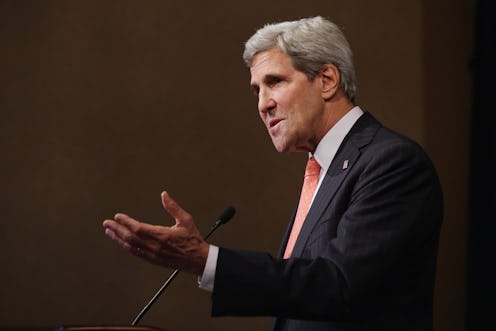News
Kerry Visits Egypt As Tensions Rise
As tensions in Egypt continue to simmer ahead of ousted president Mohammed Morsi's trial, U.S. Secretary of State John Kerry arrived in Cairo Sunday, the first visit from such a high-level American diplomat since Morsi's ouster in July. There, Kerry pressed the importance of democracy, but confirmed America's continued commitment to working with the interim government — while also pointedly stressing the need for fair, transparent trials for all Egyptian citizens.
Relations between the United States and Egypt have been strained since the military's removal of the democratically elected Morsi, and subsequent crackdown on his supporters, both of which led to the U.S. suspending hundreds of millions of dollars in aid. But at a news conference Sunday, Kerry stressed that that the freezing of aid was "not a punishment," but simply a legal requirement, which is true — the Foreign Assistance Act actually forbids the U.S. from providing financial aid to nations whose elected head of government is deposed either by military coup or decree. The Secretary of State stressed the U.S.'s continued support of the Egyptian people, saying: 'We are committed to work and we will continue our cooperation with the interim government."
He also said that "there are indications" that Egypt's authorities are "intending" to restore democracy — which really is a fancy, rhetorical way of saying that they're clearly not there yet — and urged that relations between the two countries would regain full strength only when that happens.
"The United States believes that the U.S.-Egypt partnership is going to be stronger when Egypt is represented by an inclusive, democratically elected civilian government based on rule of law, fundamental freedoms and an open and competitive economy," he said.
"History has demonstrated that democracies are more stable, viable and prosperous than any alternative," he added. "With stability comes tourism and investment, and with both come jobs."
Kerry arrived at a particularly tense juncture, a day before Morsi, along with 14 other Muslim Brotherhood leaders, are due to appear in court on charges of inciting violence. The impending trial has already drawn mass pro-Brotherhood protests and the fear of more violence, as well as criticism from aid groups.
"Whether or not Morsi actually ends up appearing in court, I think there is likely to be a very angry reaction either way," said Heba Morayef, the Egypt researcher for Human Rights watch. "And then possibly violence.""Already we've seen very, very serious violations of the right of a fair trial and Morsi's right to be free of arbitrary detention," she added.
On Sunday, Morsi's family announced that it would not be attending the trial, saying it did not recognize its legitimacy."[Morsi] is kidnapped. He is held hostage," Osama Morsi said — a view also held by the Muslim Brotherhood, who have called it "a means of repression and terror used by the coup regime against opponents."
Although U.S. officials have maintained the timing of the visit was purely coincidental, Kerry used the opportunity to press the need for fairness and transparency in all judicial proceedings.
The military-backed government has drawn condemnation for puting Morsi on trial for inciting violence among protesters, while simultaneously failing to investigate their own fatal crackdowns on demonstrators. And concerns have grown also as the committee writing Egypt’s constitution debates a clause that would grant the military extra privileges — such as the the right to try civilians in secret military courts.
“They’re in the streets, they are the law enforcement,” Morayef said. “So if a military officer thinks you have insulted him at a checkpoint, you can be brought to a tribunal. If you are arrested by a military officer, you can be brought to a tribunal.”
“This is not a moment where there is any likelihood of limiting the military’s privileges [in the constitution]" Morayef added. “They see the civilian justice system as an infringement. And one of the privileges the military has clung to very consistently is the broad discretion to punish and try people as they choose. They really care about maintaining that.”
A final draft of the constitution is expected to be finished by Dec. 3.
